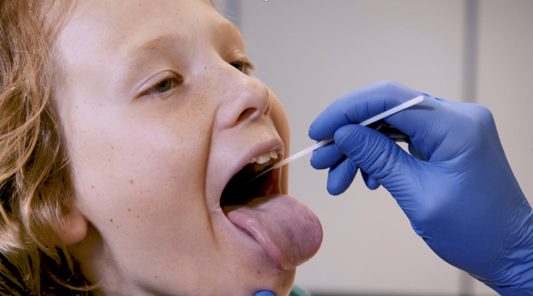Search
Research
Validation of a rapid, saliva-based, and ultra-sensitive SARS-CoV-2 screening system for pandemic-scale infection surveillanceWithout any realistic prospect of comprehensive global vaccine coverage and lasting immunity, control of pandemics such as COVID-19 will require implementation of large-scale, rapid identification and isolation of infectious individuals to limit further transmission. Here, we describe an automated, high-throughput integrated screening platform, incorporating saliva-based loop-mediated isothermal amplification (LAMP) technology, that is designed for population-scale sensitive detection of infectious carriers of SARS-CoV-2 RNA.
Research
Complications associated with paediatric airway management during the COVID-19 pandemic: an international, multicentre, observational studyRespiratory adverse events in adults with COVID-19 undergoing general anaesthesia can be life-threatening. However, there remains a knowledge gap about respiratory adverse events in children with COVID-19. We created an international observational registry to collect airway management outcomes in children with COVID-19 who were having a general anaesthetic.
Research
End-user acceptability of personal protective equipment disinfection for potential reuse: a survey of health-care workers in Aotearoa New ZealandThe COVID-19 pandemic has highlighted personal protective equipment (PPE) supply, distribution, and disposal issues worldwide. Calls to conserve PPE stocks and increase supply resulted in the rapid development of potential disinfection methods, with the possibility of improvements in medical waste reduction. However, how receptive health-care workers are to PPE reuse remains unknown. We aimed to examine the views of health-care workers who used PPE during the first COVID-19 wave in Aotearoa New Zealand, in relation to acceptability of PPE disinfection and reuse.
Research
Longitudinal changes in wellbeing amongst breastfeeding women in Australia and New Zealand during the COVID-19 pandemicThe COVID-19 pandemic has impacted new mothers’ wellbeing and breastfeeding experience. Women have experienced changes in birth and postnatal care and restricted access to their support network. It is unclear how these impacts may have changed over time with shifting rates of infection and policies restricting movement and access to services in Australia and New Zealand.
Research
The seasonality of respiratory syncytial virus in Western Australia prior to implementation of SARS-CoV-2 non-pharmaceutical interventionsRespiratory syncytial virus (RSV) seasonality is dependent on the local climate. We assessed the stability of RSV seasonality prior to the SARS-CoV-2 pandemic in Western Australia (WA), a state spanning temperate and tropical regions.
Research
An Unusual Resurgence of Human Metapneumovirus in Western Australia Following the Reduction of Non-Pharmaceutical Interventions to Prevent SARS-CoV-2 TransmissionNon-pharmaceutical interventions (NPIs) to reduce SARS-CoV-2 transmission disrupted respiratory virus seasonality. We examined the unusual return of human metapneumovirus (hMPV) in Western Australia following a period of absence in 2020.
Research
Consensus guidelines for the diagnosis and management of invasive aspergillosis, 2021Invasive aspergillosis (IA) in haematology/oncology patients presents as primary infection or breakthrough infection, which can become refractory to antifungal treatment and has a high associated mortality. Other emerging patient risk groups include patients in the intensive care setting with severe respiratory viral infections, including COVID-19.

News & Events
COVID tests well tolerated by WA school kidsA study conducted across 40 WA schools has found COVID-19 testing using a combined nose and throat swab was well tolerated by children as young as 4 years.

News & Events
Minderoo Foundation funds vaccine trial to protect WA healthcare workers from COVID-19At least 2,000 WA healthcare workers will help test whether an existing tuberculosis vaccine can reduce their chance of COVID-19 infection, lessen the severity of symptoms and boost immunity.

News & Events
Community advocate jumps on board with new COVID-19 advisory groupLike many of us, consumer and community advocate Catherine Hughes is worried about the impact of COVID-19. So she joined Australia’s first COVID-19 consumer reference group to be a voice for the community.
